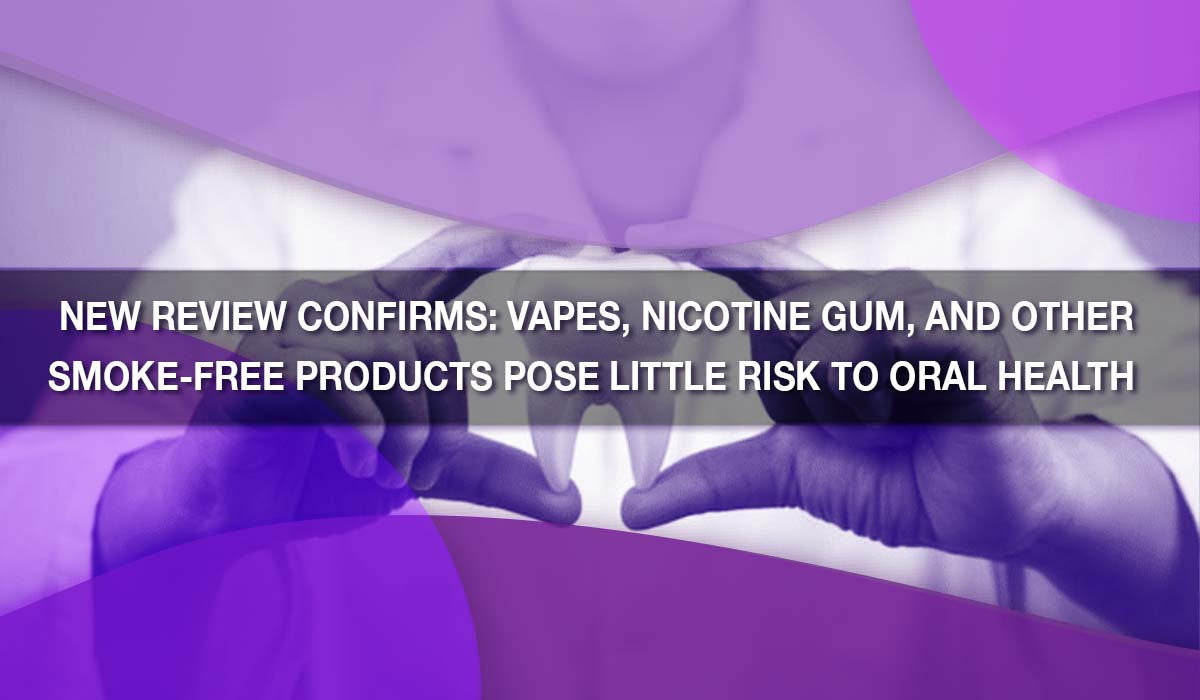
New Review Confirms: Vapes, Nicotine Gum, and Other Smoke-Free Products Pose Little Risk to Oral Health
A major global review just gave people who use non-combustible nicotine products (NCNPs)—like vapes, nicotine gum, sprays, and snus—something to smile about.
Led by the Center of Excellence for the Acceleration of Harm Reduction (CoEHAR) in Catania, Italy, and published in the journal Addiction, the new review examined whether NCNPs negatively affect oral health. The verdict? These products are generally safe for your mouth, with side effects that are rare, mild, and comparable to those seen with placebo treatments.
Oral Health Risks: Blown Out of Proportion?
Tobacco harm reduction has long been a controversial topic, especially when it comes to how alternative nicotine products affect oral health. But this comprehensive review—based on 36 randomized controlled trials, including 21 used in a meta-analysis—shows that the oral side effects of NCNPs are often overstated.
Across the board, the researchers found that:
NCNPs caused no significant damage to oral tissues.
Side effects like dry mouth or canker sores were typically mild and self-resolving.
These effects were “more likely due to the mode of delivery,” like chewing or vapor inhalation—not nicotine or ingredients in the product.
No NCNP consistently caused oral side effects serious enough to make people stop using them.
For instance, nicotine gum was occasionally linked to canker sores, sprays slightly increased odds of irritation, and snus sometimes caused local discomfort. But none of these reactions were serious or common enough to warrant alarm.
What This Means for Smokers
The real danger to oral health still comes from smoking combustible tobacco. Cigarette smoke is known to:
Cause gum disease and tooth loss
Slow healing and increase infection risk
Raise the likelihood of oral cancers
By contrast, NCNPs do not involve burning tobacco, so they eliminate the toxic by-products of combustion. For smokers who are worried about their gums, teeth, or oral tissue but aren’t ready to quit nicotine entirely, switching to NCNPs can be a huge step in the right direction.
The authors write:
“For individuals who smoke and are concerned about oral health, the use of NCNPs may represent a harm reduction strategy with fewer oral health risks.”
Practical Guidance for Clinicians
This review also offers helpful, real-world advice for healthcare and dental professionals. Not every NCNP suits every patient—and that’s okay.
Patients with jaw pain or dentures may find gum uncomfortable.
Those who dislike vapor may prefer sprays or lozenges.
Tailoring product recommendations to individual needs and preferences may improve adherence and help more smokers make the switch.
In fact, the study encourages dental professionals to play a more active role in harm reduction. By providing accurate information and product guidance, dentists can help patients reduce their risk—even if they’re not ready to quit nicotine entirely.
Low Risk, High Reward
While the authors do note that some of the included studies were small and relied on self-reported symptoms—leading to an overall “low certainty” rating—the pattern was clear: NCNPs are not causing serious oral problems.
That means fewer excuses for misinformation and more evidence-based support for people seeking safer alternatives to smoking.
Final Word
This landmark review sends a clear message: when it comes to oral health, non-combustible nicotine products are a far safer choice than smoking.
No, they’re not perfect—but they’re a huge leap forward. For the millions of adults trying to quit or cut down on cigarettes, these findings offer both reassurance and a practical path toward better health.
Read the study here:









Leave a comment
This site is protected by hCaptcha and the hCaptcha Privacy Policy and Terms of Service apply.